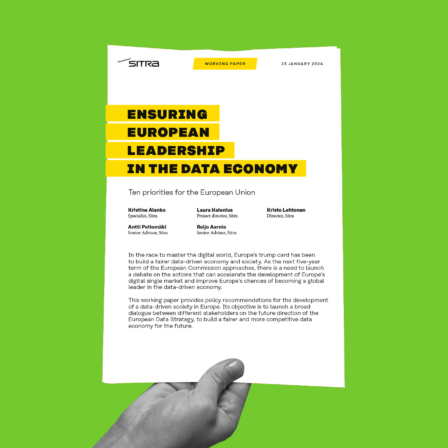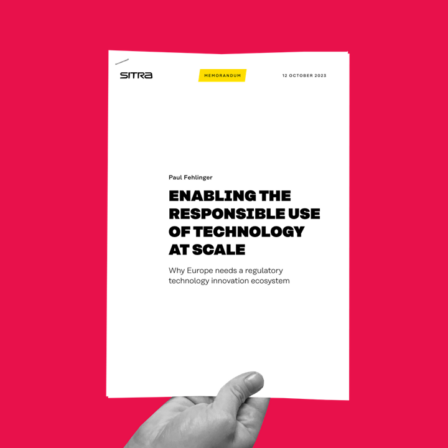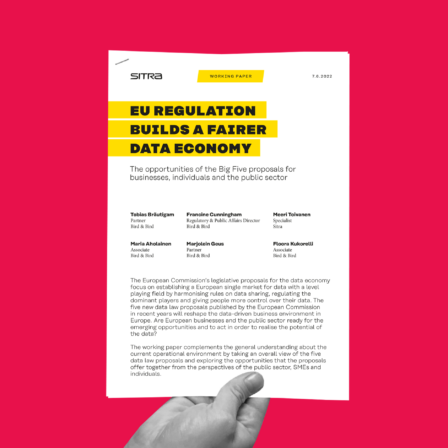Study on Data Strategy 2.0
Europe’s data strategy needs to be renewed to make data work for European competitiveness, human well-being, democracy and sustainable solutions. Sitra has prepared a report to open a debate on the future of a fair data economy. It provides recommendations and input for the new European Commission that will take office at the end of 2024.
What is it about?
The Data Strategy, presented by the European Commission in February 2020, has guided the development of a data-driven economy, artificial intelligence and society in the EU and has led to new EU legislation to create a fairer playing field for a data-driven economy. The Commission’s aim has been to build a functioning internal market for data that can increase the EU’s share of the global data economy and create added value for people, businesses and the environment.
The strategy is based on a vision of European values, fundamental rights and putting people at the heart of the data economy. It has also led to a wide range of measures, such as building a cross-sectoral governance framework for the internal market for data, increasing investment in data infrastructures, improving the skills of individuals and small businesses, and creating sector-specific data spaces or data domains. Sitra has opened up opportunities for businesses, people and the public sector in its working paper on EU regulation to build a fairer data economy.
Securing investment and strategic independence is crucial to ensure Europe’s competitiveness. Democratic institutions must control technology and market forces and ensure that fundamental European rights are respected in the physical and virtual world and augmented reality. Technological developments are redefining not only the interaction between people and technology but also the way in which groups of people interact. Internationally, the ethical aspects of digitalisation are becoming increasingly important, and regulation of AI and related technologies is evolving rapidly.
Technological developments must also be compatible with the carrying capacity of nature and support the digital and green twin transition. Digital technologies are essential to support the green transition, productivity and prosperity. However, the digital and green transitions are not automatically linked and care must be taken to use digitalisation to promote the green transition. Digital technologies have a very significant carbon footprint of their own, which also requires technological development and attention.
As technology develops, the EU must take the lead in setting fair rules. The European Data Strategy has balanced innovation with the realisation of fundamental rights and freedoms. The next European Commission, like the current one, must continue to uphold European values and work over the long term to create a functional and efficient business environment for the data economy.
Finland is known as a forerunner in technology and digitalisation, and its voice on these issues is stronger than ever in EU decision-making. Work on the national data economy roadmap, led by Sitra, has recognised that Finland should also contribute its views on the fair data economy to EU initiatives at an early stage. Roadmap network participants consider it important to formulate common positions early on, for example on future Commission policies and strategies.
Finnish stakeholders should actively participate in the debate on the future European Data Strategy, which the new European Commission will have on its agenda after the EU elections in 2024. To succeed, the EU’s data-driven market needs a clear structure and a visionary roadmap.
What do we do?
Sitra wants to take a long-term approach to building a fair data economy. We want to push the new Commission to reform the data strategy so that data can benefit European competitiveness, human well-being, democracy and the search for sustainable solutions.
Our aim is to open up the debate on the future fair data economy in time to formulate recommendations and follow-up questions for the new European Commission, which will take office at the end of 2024. We also want to raise selected new issues that we see as key building blocks for the future data strategy and for strengthening Europe’s strategic autonomy.
Together with our partners, we have explored views on what Europe’s new data strategy should look like. Together with Finnish stakeholders, we have explored the opportunities that the current data strategy opens up for us as a society could. We are exploring how Finland could become a forerunner of a fair and sustainable data economy and how to ensure that Finland’s messages are heard at the right places at the right time.
The report Ensuring European leadership in the data economy – Ten priorities for the European Union was published in January 2024. It is based on discussions and expert work organised by Sitra and the European Policy Centre for data economy operators in 2023.
Who is involved?
In Finland, our work involves stakeholders in the work on the national data economy roadmap, representing businesses, public authorities, research and organisations. Key ministries, the Confederation of Finnish Industries, Finnish Entrepreneurs, the Technology Industries of Finland, Technical Research Centre of Finland, the Finnish start-up community, Business Finland and the Association of Finnish Local and Regional Authorities are involved.
We will also hold discussions with our European partners from different European Commission departments (DG Communications Networks, Content and Technology (CNECT), DG Competition (COMP), DG Internal Market, Industry, Entrepreneurship and SMEs (GROW), DG Environment (ENV), DG Information Technology (DIGIT), DG Justice and Consumer Protection (JUST) and DG Research and Innovation (RTD), the European Data Protection Board, the European Parliament and member states.
Where are we now?
Sitra organised three expert events in Brussels in May and June 2023 to take stock of the bottlenecks in Europe’s current data strategy, especially from a data governance perspective. These related to issues such as the data governance model, the implementation of fundamental rights and the implementation of the current strategy.
The sessions were based on background studies commissioned by Sitra. Three background memorandums have since been published in September and October 2023:
- The right to data portability in the fair data economy – Extending the right of individuals to benefit from managing their data,
- Towards a Holistic EU Data Governance – Taking stock of the progress of the EU Data Strategy and proposals ja
- Enabling the responsible use of technology at scale – Why Europe needs a regulatory technology innovation ecosystem.
This work also builds on a working paper previously published by Sitra in 2022. In it, we analyse how changing EU legislation is implementing the objectives of the European Data Strategy and opening up new opportunities for different actors in the data economy.
The review covered the five key legislative proposals stemming from the European Data Strategy: the Data Governance Act (DGA), the Digital Markets Act (DMA), the Digital Services Act (DSA), the Artificial Intelligence Act (AIA) and the Data Act (DA).
The working paper makes recommendations for action, which can be broadly grouped into four areas:
- Finland needs to develop a wide range of measures to identify Finland as an attractive model country for the data economy.
- Public and private sector actors need to share a vision of a fair data economy.
- The public and private sectors need to share a common vision and a clear commitment for both sectors to take a proactive approach to data regulation, rather than just reacting to it.
- Understanding the basics of the data economy must become a new civic skill, and skills must be developed across the board.
Sitra’s Roadmap for a Data Economy project is working closely with a network of partners to accelerate these measures in Finland.







